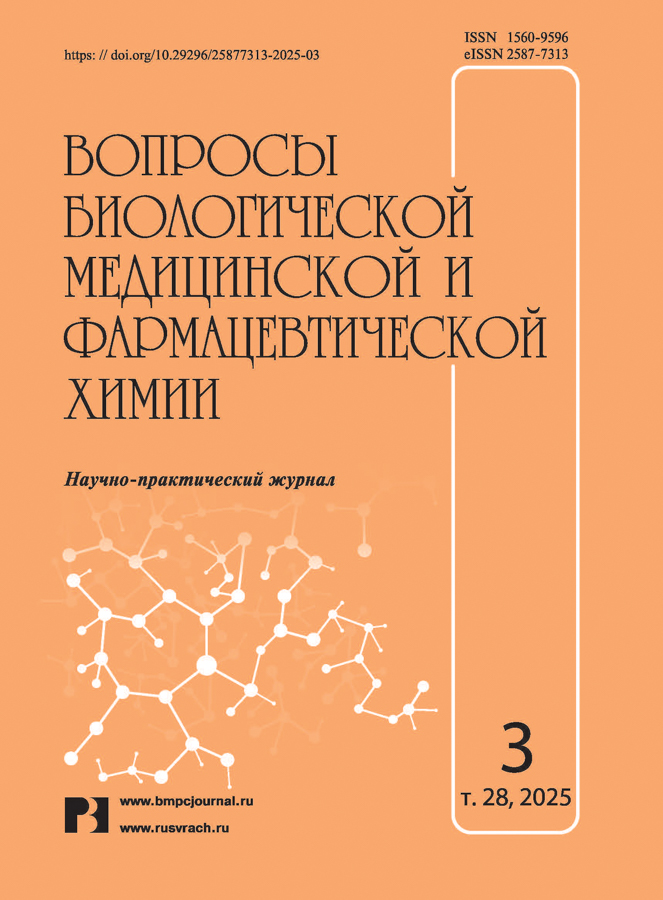The antiapoptotic effect of genistein on experimental Alzheimer's disease of the sporadic type
- Authors: Pozdnyakov D.I.1,2
-
Affiliations:
- Pyatigorsk Medical and Pharmaceutical Institute, Branch of the Volgograd State Medical University, Ministry of Health of Russia
- Pyatigorsk State Scientific Research Institute of Balneotherapy, Branch of the Federal Scientific and Clinical Center of Medical Rehabilitation and Balneotherapy of the Federal Biomedical Agency
- Issue: Vol 28, No 3 (2025)
- Pages: 53-57
- Section: Problems of experimental biology and medicine
- URL: https://journals.eco-vector.com/1560-9596/article/view/677709
- DOI: https://doi.org/10.29296/25877313-2025-03-07
- ID: 677709
Cite item
Abstract
Introduction. Alzheimer's disease is a common neurodegenerative condition that requires the improvement of existing treatment methods and the development of new ones. One possible approach to addressing this issue is to influence specific pathophysiological mechanisms, such as apoptosis of neurons.
Material and Methods. Female Wistar rats were used to model Alzheimer's disease by directly injecting β-amyloid aggregates into the CA1 region of the hippocampus. For 60 days following surgery, the rats were treated with donepezil (45 mg/kg orally) or genistein (50, 100, or 150 mg/kg orally). The rats' spatial working memory was then assessed using the Y-maze test, and the concentration of caspase-8, cytochrome C, and SMAC/DIABLO proteins in hippocampal tissue was also measured.
Results. During the study, we found that the use of genistein in various doses and donepezil contributed to the restoration of spatial working memory in rats with Alzheimer's disease. Donepezil administration led to a decrease of caspase-8 concentration by 23.3% (p<0.05), cytochrome C by 26.3% (p<0.05) and SMAC/DIABLO by 22.4% (p<0.05). Rats treated with genistein at 50, 100, and 150 mg/kg showed decreases in cytochrome C levels of 63.2%, 59.6%, and 52.6%, respectively, compared to untreated animals (p<0.05). SMAC/DIABLO protein level also decreased by 39.2%, 35.5%, and 33.7%, respectively (p<0.05 for all comparisons). There were no significant changes in caspase-8 levels between any groups. It's worth noting that cytochrome C and SMAC/DIABLO levels in genistein-treated rats were significantly lower than those in donepezil-treated rats.
Conclusions. The study demonstrated that genistein under conditions of experimental Alzheimer's disease inhibits the internal apoptotic pathway, while leaving the external apoptotic cascade unaffected. These findings support the need for further research on genistein as a potential therapeutic agent for Alzheimer's disease treatment.
Keywords
Full Text
About the authors
D. I. Pozdnyakov
Pyatigorsk Medical and Pharmaceutical Institute, Branch of the Volgograd State Medical University, Ministry of Health of Russia; Pyatigorsk State Scientific Research Institute of Balneotherapy, Branch of the Federal Scientific and Clinical Center of Medical Rehabilitation and Balneotherapy of the Federal Biomedical Agency
Author for correspondence.
Email: pozdnicakow.dmitry@yandex.ru
ORCID iD: 0000-0002-5595-8182
SPIN-code: 6764-0279
Ph.D. (Pharm.), Associate Professor, Head of the Department of Pharmacology with a course in Clinical Pharmacology; Leading Research Scientist
Russian Federation, 11 Kalinin Avenue, Pyatigorsk 357532; 30 Kirov Avenue, Pyatigorsk 357501References
- Sharifi-Rad J., Quispe C., Imran M., Rauf A. et al. Genistein: An Integrative Overview of Its Mode of Action, Pharmacological Properties, and Health Benefits. Oxid Med Cell Longev. 2021; 2021: 3268136. doi: 10.1155/2021/3268136.
- Oveisgharan S., Yang J., Yu L. et al. Estrogen Receptor Genes, Cognitive Decline, and Alzheimer Disease. Neuro-logy. 2023; 100(14): e1474–e1487. doi: 10.1212/WNL.0000000000206833.
- Li R., Robinson M., Ding X. et al. Genistein: A focus on several neurodegenerative diseases. J Food Biochem. 2022; 46(7): e14155. doi: 10.1111/jfbc.14155
- Joshi H., Gupta D.S., Abjani N.K. et al. Genistein: a promising modulator of apoptosis and survival signaling in cancer. Naunyn Schmiedebergs Arch Pharmacol. 2023; 396(11): 2893–2910. doi: 10.1007/s00210-023-02550-1.
- Kumari S., Dhapola R., Reddy D.H. Apoptosis in Alzheimer's disease: insight into the signaling pathways and therapeutic avenues. Apoptosis. 2023; 28(7-8): 943–957. doi: 10.1007/s10495-023-01848-y
- Krasovec G., Horkan H.R., Quéinnec É., Chambon J.P. Intrinsic apoptosis is evolutionarily divergent among metazoans. Evol Lett. 2023; 8(2): 267–282. doi: 10.1093/evlett/qrad057.
- Kim H.Y., Lee D.K., Chung B.R. et al. Intracerebroventricular Injection of Amyloid-β Peptides in Normal Mice to Acutely Induce Alzheimer-like Cognitive Deficits. J Vis Exp. 2016; 109): 53308. doi: 10.3791/53308.
- Gao Y., Ma K., Zhu Z. et al. Modified Erchen decoction ameliorates cognitive dysfunction in vascular dementia rats via inhibiting JAK2/STAT3 and JNK/BAX signaling pathways. Phytomedicine. 2023; 114: 154797. doi: 10.1016/j.phymed.2023.154797.
- Kraeuter A.K., Guest P.C., Sarnyai Z. The Y-Maze for Assessment of Spatial Working and Reference Memory in Mice. Methods Mol Biol. 2019; 1916: 105–111. doi: 10.1007/978-1-4939-8994-2_10.
- Madani Neishaboori A., Nasseri Maleki S., Saberi Pirouz M. et al. Donepezil attenuates injury following ischaemic stroke by stimulation of neurogenesis, angiogenesis, and inhibition of inflammation and apoptosis. Inflammopharmacology. 2021; 29(1): 153–166. doi: 10.1007/s10787-020-00769-5.
- Gao B.L., Che N.N., Li X., Ren C.F. Neuroprotective effects of donepezil against Aβ25-35-induced neurotoxicity. Eur J Med Res. 2022; 27(1): 219. doi: 10.1186/s40001-022-00862-1.
- Li M., Yu Y., Xue K. et al. Genistein mitigates senescence of bone marrow mesenchymal stem cells via ERRα-mediated mitochondrial biogenesis and mitophagy in ovariectomized rats. Redox Biol. 2023; 61: 102649. doi: 10.1016/j.redox.2023.102649.
- Liccardo M., Sapio L., Perrella S. et al. Genistein Prevents Apoptosis and Oxidative Stress Induced by Methylglyoxal in Endothelial Cells. Molecules. 2024; 29(8): 1712. doi: 10.3390/molecules29081712.
Supplementary files







